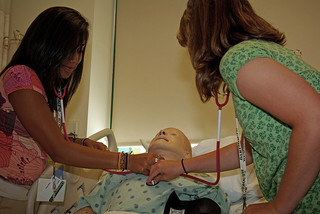Health Care Jobs Not Going To Latinos, Study Finds
 By Griselda Nevárez, Voxxi
By Griselda Nevárez, Voxxi
One-third of the nation’s fastest growing occupations, for example, are related to health care, according to the U.S. Bureau of Labor Statistics.
Despite this trend, Latinos — who will be responsible for most of the workforce growth in the next eight years — continue to be significantly underrepresented in the health industry.
One organization is hoping to change that.
Excelencia in Education, a non-profit organization headquartered in Washington, D.C., compiled a list of the top 25 institutions that are making an effort to attract more Latinos into the health professions.
“This is responding to conversations we’ve had with recruiters and employers who say they want to hire Latinos, but they just don’t know where to find them,” said Deborah Santiago, Excelencia in Education vice president for policy and research.
The states graduating more Latino health professionals include Texas, Florida, California, Arizona, Illinois, New Mexico and Puerto Rico, according to Finding Your Workforce: The Top 25 Institutions Graduating Latinos in Health Professions and Related Programs by Academic Level.
Other findings include that Latinos are more likely to be employed in lower-paying positions in the health care industry rather than in the highly-skilled ones.
It cited that in 2011, Latinos represented 14 percent of those employed in support occupations, the name given to the lower-paying positions that pay as little as $21,000 annually. These include fields such as home health aides and nursing aides.
Only 7 percent of Latinos occupied highly-skilled positions, with salaries that pay four times more than the low-skilled positions. These include practitioner and technical occupations, such as physicians, surgeons and dentists.
Part of the problem for Latinos not reaching the higher-paying occupations in the health care sector is due in large part because 70 percentof Latino students are studying for certification and associate degrees. These generally lead to low-paying positions.
Meanwhile, only 7.69 percent of students who graduated from medical school last year were Latinos, according to the Association of the American Medical Colleges.
Santiago, who authored the report, said it is essential to promote Latinos into higher-skilled health occupations.
“If we don’t have more Latinos going into the graduate level, they are not going to go on to become the surgeons, physicians, dentists and practitioners that we will need in this country,” she said. “We need to find pathways to get them there.”
To view the top 25 institutions graduating the most Latinos in health professions, click here.
This article first apeared in Voxxi.
Griselda Nevárez is a reporter with Hispanic Link News Service in Washington D.C.
[Photo by Ano Lobb. @healthyrx]
